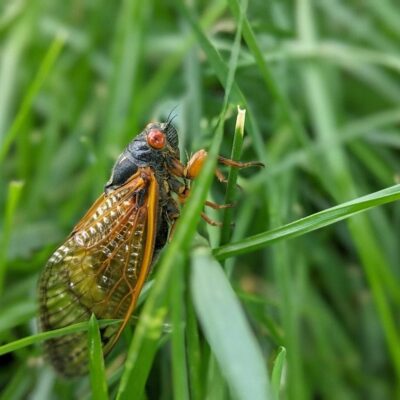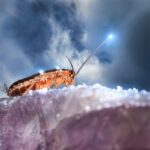No, dogs should not eat cicadas because the insect’s external skeleton can harm them. While eating one or two cicadas should be a huge deal, overindulging can lead to choking and gastrointestinal issues, including obstruction. Dogs might also intake pesticides while eating cicadas, which can harm a dog’s health.

Caution: This food is generally considered risky by the veterinary community. Dogs should not eat this food and should be monitored for adverse effects.
| Food Safety | Eating one or two cicadas should be fine. However, eating more than that can lead to health issues. |
|---|---|
| Nutritional Issues | Cicadas have large wings and a hard exoskeleton. Both these features are harsh on a dog’s digestive system and can lead to several gastrointestinal issues. Cicadas are also exposed to pesticides and chemicals that can cause significant health issues in dogs. |
| Potential Risks | Eating too many cicadas can lead to severe stomach problems, intestinal obstructions, intestinal perforations, and toxicity from pesticides. Some dogs might also suffer from an allergic reaction to cicadas. |
Symptoms: if your dog has eaten too many cicadas, look for these symptoms:
- Vomiting
- Diarrhea with or without blood
- Abdominal pain
- Lethargy
How Many Cicadas are Bad for Dogs?
There is no set amount where cicadas start being bad for dogs. Most of the risk associated with it is related to the insects’ body parts being harsh on a dog’s digestive system. Therefore, choking and abdominal discomfort might happen even after eating a single cicada. Generally, your dog should be fine after eating one or two cicadas as their digestive system might be able to withstand it. More than that quantity is most like to end in gastrointestinal problems that translate into visible symptoms.
What Makes Cicadas Unsafe?
Cicadas don’t sting or bite, which might lead people to believe they can be safe for dogs to eat. However, cicadas have a solid exoskeleton and wings incompatible with digestive systems. Their rough edges and hard surfaces can cause havoc on the intestines. Cicadas also get exposed to pesticides as they are used to eliminate the insects. This means their bodies might have traces of pesticides on them. These traces of toxic ingredients can further harm a dog’s health.
Signs Your Dog Ate Too Many Cicadas
If you suspect your dog has eaten too many cicadas, be on the lookout for these symptoms:
- Diarrhea with or without blood
- Vomiting
- Lethargy
- Abdominal pain
- Appetite loss
You should seek immediate medical assistance if your dog exhibits any of these symptoms. Chances of internal bleeding are also high due to intestinal perforation.
Frequently Asked Questions
-
Cicadas are not poisonous to dogs. Therefore, if your dog eats one or two cicadas, chances are there would not be a massive issue. However, a cicada’s wings and exoskeleton harm a dog’s digestive system since they are hard and indigestible.
-
The best way to stop dogs from eating cicadas is to avoid places where cicadas might be present. Research and find out the months cicadas are most active and do not frequent places where cicadas might be most active like the woods.



